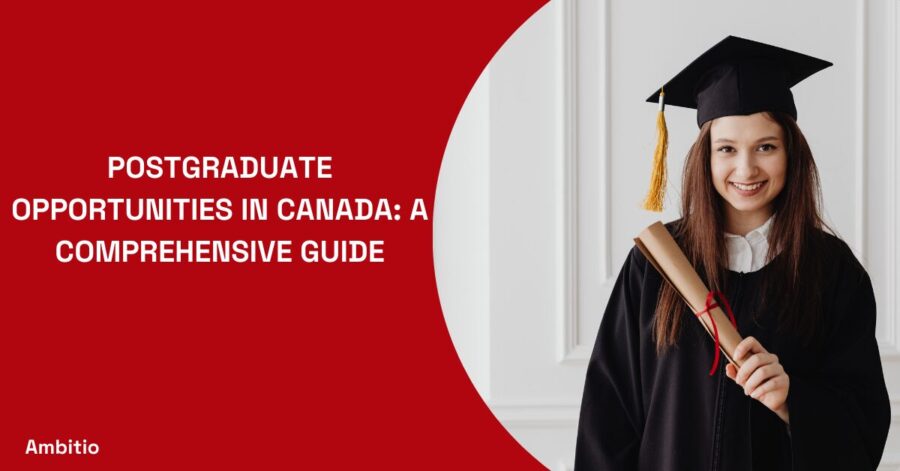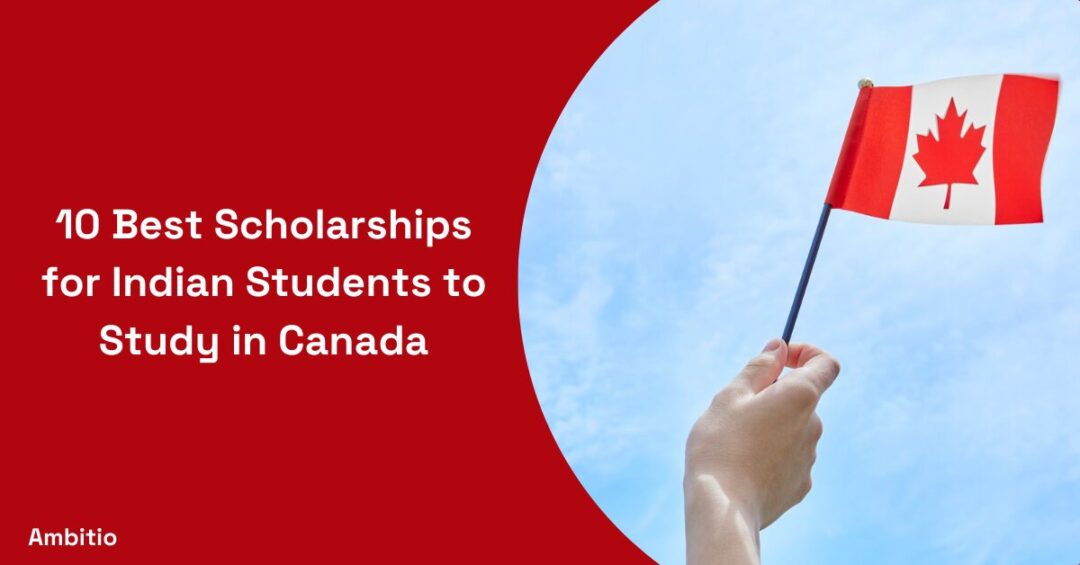13 December 2024
7 minutes read
Navigating Postgraduate Opportunities in Canada: A Comprehensive Guide for International Students

In the pursuit of higher education, Canada stands as a beacon of opportunity, particularly for postgraduate (PG) courses. Known for its diverse and inclusive educational landscape, Canadian universities provide a wide array of PG programs that are not only academically enriching but also culturally diverse, making them a magnet for international students.
This comprehensive guide delves into the nuances of pursuing postgraduate education in Canada, examining everything from course selection and eligibility criteria to tuition fees, work permits, and the potential for permanent residency.
Understanding the Postgraduate Educational Landscape in Canada
The Appeal of Canadian Universities for PG Studies
Canadian universities are celebrated globally for their academic excellence, innovative research facilities, and student-friendly environment. These institutions offer a blend of theoretical knowledge and practical skills, essential for the current job market. The universities are not just educational establishments but also hubs for cultural exchange, hosting thousands of international students each year.
Top Universities and Their Renowned Programs
Canada is home to some of the world’s leading universities like the University of Toronto, McGill University, and the University of British Columbia. These institutions offer a range of postgraduate programs across various disciplines, including Engineering, Business Management, Health Sciences, and the Arts. Each university has its unique strengths, with certain programs standing out due to faculty expertise, research facilities, and industry connections.
The Role of Canadian Culture in Education
The cultural aspect of Canadian education is as significant as the academic one. Canadian universities provide a multicultural environment, fostering global perspectives and mutual respect among students of different backgrounds. This cultural diversity not only enriches the learning experience but also prepares students for working in an increasingly globalized world.
Tailored Programs for Diverse Academic Interests
The array of PG courses offered by Canadian universities caters to a wide range of academic interests and career objectives. Whether it’s a one-year diploma or a two-year master’s program, these courses are designed to meet the evolving needs of both the job market and the students.
Specialized and Interdisciplinary Courses
Canadian universities are known for offering specialized courses in fields like Artificial Intelligence, Environmental Science, and Public Health, as well as interdisciplinary programs that combine various fields of study. These courses are structured to provide both depth and breadth in learning, equipping students with a comprehensive understanding of their chosen field.
Vocational and Professional Diplomas
Apart from traditional academic degrees, Canadian institutions also offer vocational and professional diplomas. These programs, such as those in Project Management or Human Resource Management, are more career-oriented and focused on imparting practical skills required in specific industries.
Navigating Admission Requirements and Processes
Navigating the admission requirements and processes for postgraduate studies in Canada is a crucial step for international students. Each university and program may have its specific prerequisites and application procedures, but there are common elements that applicants need to understand and prepare for.
Academic and Language Proficiency Requirements
The academic prerequisites for postgraduate courses in Canada generally require applicants to have a relevant undergraduate degree, typically with a minimum grade point average (GPA) which can vary depending on the competitiveness of the program. For example, programs in fields like Engineering or Business may require a higher GPA compared to other disciplines.
In addition to academic credentials, proficiency in English (or French for certain institutions in Quebec and other Francophone regions) is mandatory for most international students.
Standardized tests like the International English Language Testing System (IELTS), the Test of English as a Foreign Language (TOEFL), or the Pearson Test of English (PTE) are widely accepted. Minimum score requirements again vary by program and university, but generally, a score equivalent to IELTS 6.5 or TOEFL 90 is expected for most PG courses.
Some specialized programs, especially those in business or management, may also require scores from graduate-level exams like the Graduate Management Admission Test (GMAT) or the Graduate Record Examinations (GRE).
These tests assess analytical writing, quantitative, and verbal skills, providing an additional metric for universities to gauge applicants’ readiness for advanced study.
Understanding the Documentation and Application Process
The application process for Canadian universities is multifaceted and requires careful planning and attention to detail. Key components of the application include:
- Transcripts: Official academic transcripts from previous institutions are essential. These should be detailed, including courses taken and grades achieved.
- Letters of Recommendation (LORs): Most universities require two to three LORs. These should ideally come from academic professionals who are familiar with the applicant’s academic performance and potential for postgraduate studies.
- Statement of Purpose (SOP): The SOP is a critical part of the application. It should articulate the student’s academic and professional background, reasons for choosing the specific program and institution, career objectives, and how the program aligns with their long-term goals.
- Curriculum Vitae (CV) or Resume: A well-structured CV highlighting educational qualifications, work experience, achievements, and skills is often required.
- Additional Documentation: Depending on the program, additional materials such as a portfolio (for art and design courses), writing samples, or research proposals may be required.
- Proof of Financial Support: International students must provide evidence of sufficient funds to cover tuition and living expenses. This can be in the form of bank statements, scholarship awards, or financial sponsorships.
- Health Insurance: Proof of health insurance is mandatory for international students in Canada.
Decoding the Financial Aspects of Studying in Canada
One of the critical considerations for international students is the financial aspect of studying abroad. Canadian universities, while offering quality education, also come with tuition fees and living expenses that students need to plan for.
Tuition Fees and Living Costs
The cost of studying in Canada can vary significantly depending on the university and the chosen program. On average, tuition fees for international students can range from CAD 15,000 to CAD 35,000 per year. Additionally, living expenses including accommodation, food, and transportation also need to be factored in while budgeting for education in Canada.
Scholarships and Financial Aid
Securing financial aid, including scholarships, grants, and bursaries, is an important aspect for international students considering postgraduate courses in Canada.
Understanding the various types of financial support available and how to apply for them can significantly ease the financial burden of studying abroad. Here are key points to consider:
Types of Scholarships and Financial Aid
- Government Scholarships: The Canadian government offers several scholarship programs for international students. For instance, the Vanier Canada Graduate Scholarships and the Canadian Commonwealth Scholarship Program are prestigious awards for those pursuing research-oriented postgraduate programs.
- University-specific Scholarships: Many Canadian universities offer scholarships specifically for international students enrolling in their postgraduate programs. These scholarships can be merit-based, need-based, or subject-specific, such as the University of Toronto’s Ontario Graduate Scholarship or the University of British Columbia’s International Leader of Tomorrow Award.
- External Scholarships and Fellowships: Various organizations and foundations offer scholarships to students of certain nationalities or those pursuing specific fields of study. Examples include the Trudeau Foundation Scholarships and the Sauvé Scholars Program.
- Research Assistantships and Teaching Assistantships: These positions are typically offered by the universities themselves and involve part-time work in research or teaching, often related to the student’s field of study. These positions not only provide financial compensation but also valuable academic and professional experience.
- Bursaries and Grants: Bursaries are usually need-based and are provided to students who demonstrate financial need. Grants, on the other hand, can be need-based or merit-based and are often awarded for specific research projects or fieldwork.
Applying for Scholarships and Financial Aid
- Start Early: Begin researching and applying for scholarships as early as possible. Many scholarships have deadlines that are months before the start of the program.
- Check University Websites: University financial aid offices are a great resource for information on available scholarships, grants, and assistantships.
- Prepare a Strong Application: Tailor your application to highlight your academic achievements, research interests, and future goals. A well-crafted personal statement or essay can set you apart from other applicants.
- Gather Required Documents: These may include academic transcripts, letters of recommendation, a statement of purpose, and proof of language proficiency. Ensure all documents are complete and submitted before the deadline.
- Explore External Funding Opportunities: Look beyond the university for scholarship opportunities. Various organizations, governments, and foundations around the world offer scholarships to international students.
- Understand the Terms and Conditions: Each scholarship or grant has its own set of rules and requirements, such as maintaining a certain GPA, participating in community service, or working in a specific field after graduation.
- Apply for Multiple Scholarships: Don’t limit your applications to just one scholarship. Apply for as many as you qualify for to increase your chances of receiving financial aid.
- Contact Scholarship Alumni: If possible, reach out to previous scholarship recipients for advice and tips on the application process.
Post-Graduation Opportunities and Pathways
A postgraduate degree from Canada does not just end with academic achievement; it also opens up a myriad of opportunities, from work prospects to pathways toward permanent residency.
Work Permit and Employment Prospects
After graduation, international students in Canada can apply for a Post-Graduation Work Permit (PGWP), allowing them to work in the country for up to three years. The Canadian job market is receptive to graduates from its universities, with numerous opportunities across various sectors like technology, healthcare, and finance.
Permanent Residency and Long-Term Benefits
For many international students, studying in Canada is a step towards permanent residency (PR). Programs like the Canadian Experience Class and the Provincial Nominee Program offer pathways to PR for graduates who have gained Canadian work experience. This long-term benefit is a significant draw for many students choosing Canada for their postgraduate studies.
Conclusion
Canada offers a unique and rewarding experience for international students pursuing postgraduate courses. With its world-class universities, diverse programs, and welcoming environment, it stands as an ideal destination for those seeking advanced education. Moreover, the post-study opportunities in terms of work and residency make Canada not just a place to study, but a destination to build a future.
FAQs
Q1: What types of postgraduate courses are available in Canada?
Canada offers a variety of postgraduate courses including master’s degrees, postgraduate diplomas, and professional certificates in fields like Business, IT, Engineering, and Health Sciences.
Q2: What is the average cost of living for students in Canada?
The average cost of living for students in Canada can range from CAD 1,000 to CAD 1,500 per month, depending on the city and lifestyle.
Q3: How long can international students stay in Canada after completing their PG course?
International students can apply for a Post-Graduation Work Permit, which allows them to stay and work in Canada for up to three years after completing their studies.
Q4: Is it possible for international students to work while studying in Canada?
Yes, international students are allowed to work up to 20 hours per week during academic sessions and full-time during scheduled breaks like summer and winter vacations.
Q5: How competitive are scholarships for international students in Canadian universities?
Scholarships for international students can be competitive, depending on the university and the program. However, there are a considerable number of scholarships available, and students are encouraged to apply for as many as they are eligible for.

You can study at top universities worldwide!
Get expert tips and tricks to get into top universities with a free expert session.
Book Your Free 30-Minute Session Now! Book a call now




























